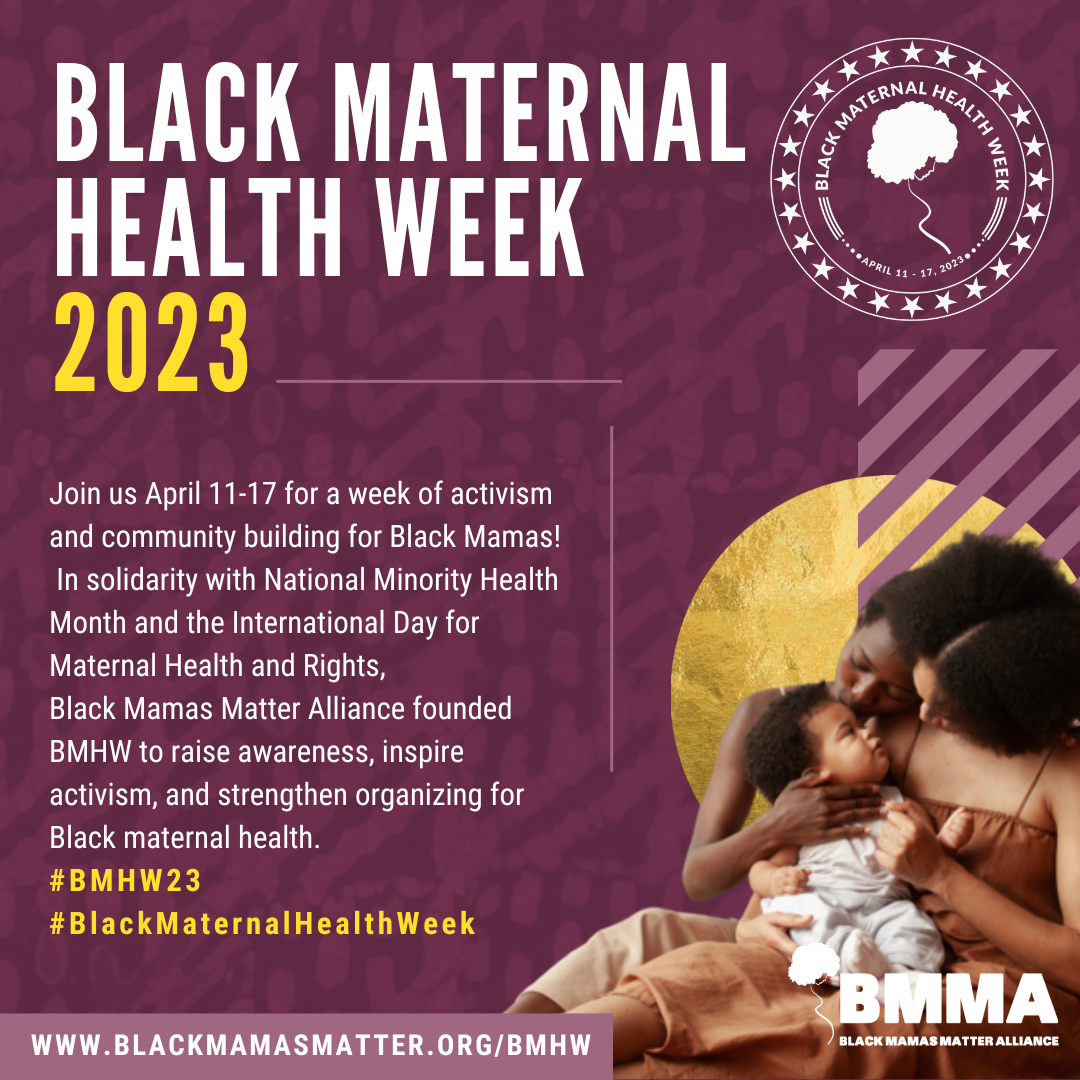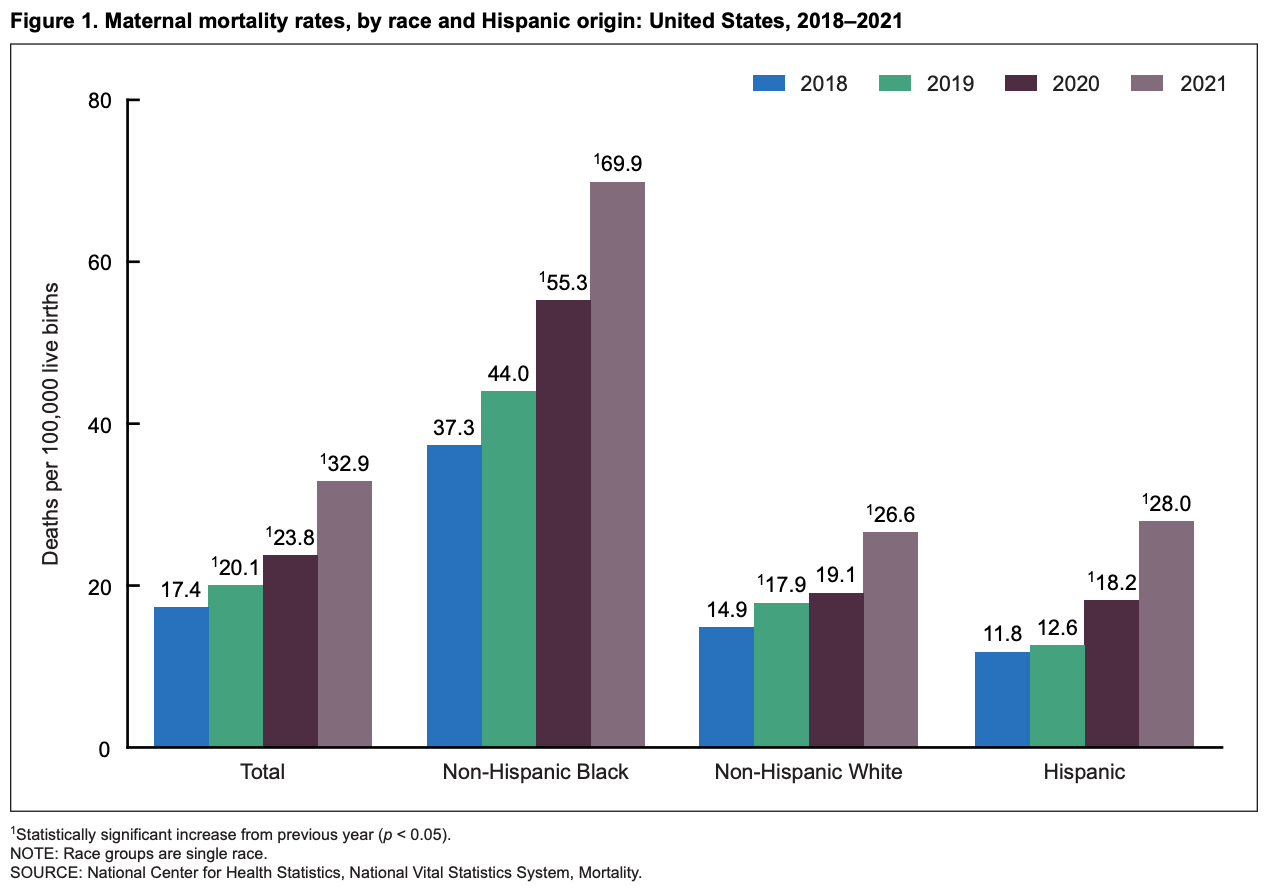At Physicians for Reproductive Health, we’re thrilled to join our partners, the Black Mamas Matter Alliance, to celebrate the 6th annual Black Maternal Health Week!
 Black Maternal Health Week is a chance for all of us to amplify the voices, perspectives, and lived experiences of Black mamas and people who give birth. This week challenges us to grapple with current laws and policies and fight for better access to care and health outcomes for Black mamas and birthing people. Given the multiple public health crises we face today, we want to use this as an opportunity to discuss the intersection of maternal health and reproductive health and why you should support laws like the Black Maternal Health Momnibus Act, the Women’s Health Protection Act (WHPA), and the Equal Access to Abortion Coverage in Health Insurance Act (EACH).
Black Maternal Health Week is a chance for all of us to amplify the voices, perspectives, and lived experiences of Black mamas and people who give birth. This week challenges us to grapple with current laws and policies and fight for better access to care and health outcomes for Black mamas and birthing people. Given the multiple public health crises we face today, we want to use this as an opportunity to discuss the intersection of maternal health and reproductive health and why you should support laws like the Black Maternal Health Momnibus Act, the Women’s Health Protection Act (WHPA), and the Equal Access to Abortion Coverage in Health Insurance Act (EACH).
Recent CDC data has once again revealed a significant increase in U.S. maternal mortality, with Black women dying at more than twice the rate of white women. As an organization representing a network of nearly 500 physicians nationwide, we cannot stand by while pregnant people are dying at an increasing rate.
Our healthcare system, which has allowed structural racism and oppression to persist, is failing Black women and birthing people. Black women and birthing people face increasing barriers and restrictions to basic and essential health care, leading to less access to high-quality, affordable health care for them than in other communities. Black women are also more likely to be uninsured or underinsured and, as a result, are often forced to delay care because they face higher out-of-pocket costs. And while most people will have healthy pregnancies, some will experience illnesses or conditions where pregnancy can cause serious health problems. Altogether, these challenges create an increased risk for health complications from childbirth for Black women compared to white women.
Research has found that a nationwide abortion ban would result in a 24% increase in maternal death, with Black women experiencing an even worse increase of 39%.
The Supreme Court’s decision in Dobbs v. Jackson Women’s Health Organization, overturning Roe and taking away the constitutional right to abortion, has only compounded barriers to this essential care and is making health outcomes worse. Attacks on reproductive health care disproportionately harm Black, Brown, Indigenous, and people of color. More specifically, bans and restrictions on abortion care negatively impact maternal health outcomes. Research has found that a nationwide abortion ban would result in a 24% increase in maternal death, with Black women experiencing an even worse increase of 39%. Abortion access is a matter of access to essential basic health care.
What’s more, additional research shows that states with higher numbers of abortion restrictions are the same states with poorer maternal health outcomes and tend to have fewer supportive policies in place for parenting people and their families. Attacks on abortion access are rooted in the legacy of white supremacy and a desire to control the reproductive lives of Black women and birthing people and other people of color.
While this reality is devastating, it doesn’t have to be this way. Last year, Congress made the optional 12-month postpartum Medicaid coverage permanent. This means that people with pregnancy-related Medicaid coverage won’t lose their health care after the typical 60 days after the pregnancy ends. This is a huge win and an important first step because continuous health insurance plays a critical role in keeping pregnant people healthy during and after pregnancy! However, this is an optional program that currently only 30 states and D.C. have adopted. Where you live should not determine or limit your access to health care. Congress needs to build upon this action and prioritize additional policies aimed at addressing maternal health more broadly, including revisiting provisions from last year’s Black Maternal Health Momnibus Act, and passing the Women’s Health Protection Act (WHPA) and the Equal Access to Abortion Coverage in Health Insurance Act (EACH).
The EACH Act and WHPA, which would reverse the Hyde Amendment and related abortion coverage restrictions, and create a new legal protection for the right to provide and access abortion care, would address significant barriers to abortion care. The Momnibus Act is critical to broadly address maternal health across multiple dimensions, including increasing access to midwives and doulas, which is proven to improve maternal health outcomes. These bills working together would ensure people can get the abortion care they need where they live regardless of how much money they make and would provide critical supports for Black Mamas and people who give birth.
We must address maternal health disparities in tandem with increasing access to abortion to ensure that Black women and birthing people are able to control their reproductive lives.
Until next time,
 |
Adrienne Assistant Director, State Policy |

